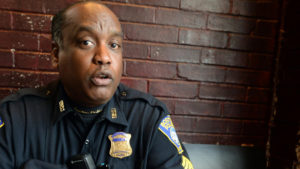A black Boston police sergeant with more than 25 years experience says he was passed over for promotion to lieutenant in favor of white officers, including one who oversees the department’s public relations unit, even though both cops got the same score on the civil service exam.
Sgt. Paul Joseph and the white officer who was promoted last November, Lt. Michael McCarthy, a Boston Police Department spokesman, both scored an 87 out of 100 on the exam, records show.
Joseph, 51, has held that rank since 1997 and is a past president of the Massachusetts Association of Law Enforcement Officers (MAMLEO). He is also part of a 2012 class action suit in federal court against the city accusing the BPD of failing to promote qualified black officers.
A Herald special report last week, using the BPD’s own data, showed only a slight uptick of minorities in the ranks of superior officers — captains, lieutenants and sergeants — during the first 16 months Mayor Martin J. Walsh has been in office. In that report, Commissioner William B. Evans said his hands were tied on promotions by civil service exams.
Joseph disputed that statement.
“The notion that his hands are tied is not true. I was there to be promoted for over a year. … It’s not about me. I’m happy. I’m content,” he said. “This is about the future of the department. Diversity is important. … It’s important that people have a sense that the system is fair and transparent and inclusive. And there are equal opportunities for everyone.”
Superintendent-in-Chief William G. Gross, speaking for Evans, said that Joseph wasn’t promoted because he has a poor work ethic. The BPD also noted that an equal number of black and white sergeants who scored in the 87 percent range — three each — were promoted to lieutenant.
A department spokesman also says Joseph has a pending internal investigation against him, but he couldn’t disclose what the matter was about.
“I’m quite happy with the selections the commissioner has made because I know the work ethic of those individuals,” said Gross, who is the highest-ranking minority in the BPD. “When we come down to the selection process, it’s based on qualifications.”
McCarthy, who was promoted to sergeant in 2006, declined multiple requests for comment.
Joseph turned over his personnel file to the Herald. It shows that since his hire date in 1989, there have been four complaints lodged against him and all were labeled “none” under discipline. Two of the complaints were also classified as “not sustained,” meaning the allegation wasn’t proven. The BPD confirmed Joseph has no sustained internal complaints against him.
Joseph said that a supervisor with internal affairs told him his open case was from November 2013 — about the time he became eligible for promotion — when he was accused of leaving a polling place at the State House.
“Sgt. Joseph left the polling place without being properly relieved,” records stated. Joseph said he believes that case should have been closed because he received a verbal warning from his supervisor.
He also disputed Gross’ view of his job performance.
“I’ve never been suspended. I’ve never had a written reprimand. I haven’t used a sick day in two years,” Joseph said. “Frankly, I don’t know what the chief is talking about. The politics of personal destruction must end.”
The latest BPD data obtained by the Herald show that 46 out of 50 lieutenants, or 92 percent, are white men or white women. Three lieutenants are black men, and one is an Asian man, records show.
All told, 146 of the BPD’s 177 sergeants, or 82.5 percent, are white men or white women, according to the data. Of the BPD’s 20 captains, 17 are white men; the other three are a black man, a Hispanic man and an Asian man.
Evans defended his minority record earlier this month in a Herald interview.
“It’s a state-run system,” he said referring to civil service exams. “If I could today go down and make minority sergeants, lieutenants to reflect diversity, I would. But those are state-run. What we have control over is our command staff and our commitment to diversifying speaks for itself.”
Larry Ellison, a Boston police detective and current president of MAMLEO, said it’s a “travesty” that Joseph hasn’t been promoted, given his experience, his lack of a disciplinary history and his multiple collegiate degrees, including a J.D. from Suffolk University Law School.
“If the need is greater in one area, why wouldn’t you do a little bit more to try and put things in line?” Ellison said. “We’re not lacking white supervisors in the Boston Police Department.”

